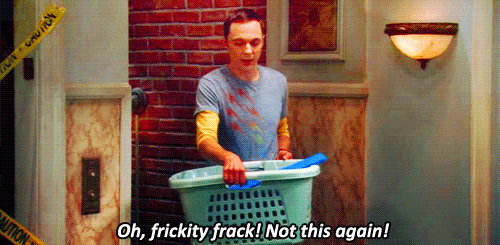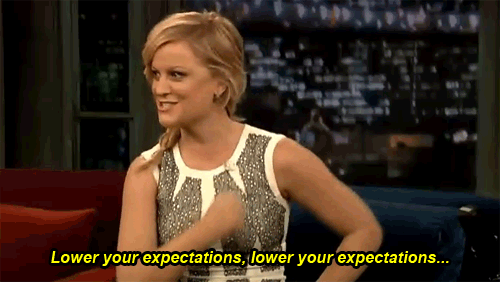First, the thing about book descriptions that I don't like. It's not necessarily a dealbreaker, but something that makes me groan whenever I see it. You know the moment, when you're scrolling through Goodreads and you see a book that looks interesting, so you click to learn more. That's when the awkward moment occurs. You see it, dun dun DUN... "This super popular thing meets this other unrelated super popular thing."
I mean I get it, you want to find an audience for the book, and you want to find the right audience. Comparing it to something similar and popular book, TV show, and/or movie will ensure that those fans take notice. But for me it can feel like pandering. It's almost like you are trying to take advantage of that cultural phenomenon. Not to mention that it makes it really hard to keep things mysterious. If I am already thinking about the similarities it's really hard to keep things secret. And in rare cases it can even spoil the book. Like if you are trying to keep the idea that there are vampires in your book secret, don't compare it to Dracula, I hated the dramatic irony in that book and I will hate in yours. And worse than that, it offers unfair comparisons for the new book for me. I know it's not right but if you are going to compare this book to something I love like The Hunger Games, Harry Potter, or Game of Thrones than I am going to expect it to be on that level. I will have really high expectations and that always leads to disappointment.
In general, I think that the best thing to do when it comes to book descriptions is to use certain words and phrases that will appeal to fans of a certain type of book just as much as the obvious comparison. Allow the reader to find their own references to their favorite type of books. I think most people will be able to do it. They'll be just as attracted to a book if it has a great cover, an intriguing tagline, and an interesting synopsis. There are certain buzzwords that will even allow us to make those comparisons ourselves. And even if we aren't able to figure it out completely we'll still be interested in picking up that book. So here is a list of some of my favorite buzzwords. I'm going to stick with SciFi/Fantasy because that is my favorite genre and also the genre I find most guilty of the comparison tactics.
Why: These descriptors imply that the main character is on the dubious side of things, that they're against for the law and even above the law. Makes for a really interesting MC. These sorts of characters are my absolute favorites. I have never been disappointed by a lovable rogue. They're badass but funny characters and I love them!
Why: Two reasons. First, if there is a lot of death and dying it's going to be a darker kind of story and I love that. Second, it tells me that no one is safe. And the idea of revenge because of a death usually has a great Heroes Journey and leads to a more interesting conflict for me.
Why: Obviously this means political intrigue. I love my fantasy when it involves politics and/or overthrowing an oppressive government. It usually leads to odious characters and a lot of analysis of good and evil which often includes manipulation. And like the death descriptor it creates a great conflict within the book. I always love that.
Why: This is just my favorite kind of magic system. It's not always the most creative but I still love it. There's so many different possibilities and it makes for more interesting magic. Elemental magic is hard to make creative for me but this kind of magic is the kind I adore. Even if it's as basic as telekinesis or mind-reading which you see a lot it's still really cool to me.
 5.) Magical Land, Mysterious Land, Alternate dimension. Especially if it says "finds themselves in."
5.) Magical Land, Mysterious Land, Alternate dimension. Especially if it says "finds themselves in."
Why: This one is simple. It typically means that it's a high fantasy and a world where magic is a normal occurrence which always makes for an interesting read for me. And I especially like it if there is an implication that it's a world within a world kind of thing because of the elements of contrast.
Why: Because of the banter! No but seriously, I just love this romantic trope. It makes for lots of laugh out loud moments, internal struggle for the main characters, and a slowburn kind of romance that has me wanting to smoosh their faces together!
Examples: The Young Elites, These Broken Stars, This Shattered World, Legend

7.) A Historical Time Period. Bonus points if it is one of my favorite periods like the late 1700s, the mid to late 1800s, and the early 1900s.
Why: Well my second favorite genre is Historical Fiction so there will always be a special place in my heart for Historical Fantasy. I love the world-building that combines something unknown with something known. And those particular periods are periods of a lot of transition so it makes for an interesting and complex story.
Examples: The Falconer, Something Strange and Deadly, The Golem and the Jinni, A Great and Terrible Beauty
7.) A Historical Time Period. Bonus points if it is one of my favorite periods like the late 1700s, the mid to late 1800s, and the early 1900s.
So those are my thoughts on book descriptions. How do you feel about the comparison between a new book and a really popular book that is similar? What are your favorite buzzwords. Leave me a comment with your thoughts. Thanks for stopping by and HAPPY READING!







Oh. My. God. I HATE when I see book descriptions that say "for fans of xyz." Like, um... No. I can decide what I'm going to read based on what I like. I don't need you to tell me what I like or don't like. Ugh. Great discussion!
ReplyDeleteTracy @ Cornerfolds
I'm with you! I can decide on my own if I want to read a book. I don't hate the "for fans of..." as much as I hate the "this meets this" though. But wither way it gives me unfair comparisons in my head. Or maybe I'm okay with it if it's a blogger saying it as opposed to it being in the synopsis. A synopsis should really just be a description of the book. I can make the connection myself.
DeleteI'm like Tracy, I don't care for the "if you like..." especially if it's printed on the book. When I'm reading reviews by bloggers and they compare something to say The Westing Game and have reasons, then I'm more apt to give the book more thought especially when I've read the book they are comparing. My Buzzwords probably are assassin and magical, even fairytale re telling often piques my interest.
ReplyDeleteI agree. I'm okay with it in a review if they have reasons why they made the comparison. But calling all dystopia "for fans of The Hunger Games" and all epic fantasy "for fans of Game of Thrones" absolutely feels like pandering. Those are some great buzzwords. I'm interested if it mentioned magic in the synopsis, absolutely. Fairytale retellings peak my interest too but for me it's not really a buzzword that will have me sold, I often need something else.
Delete